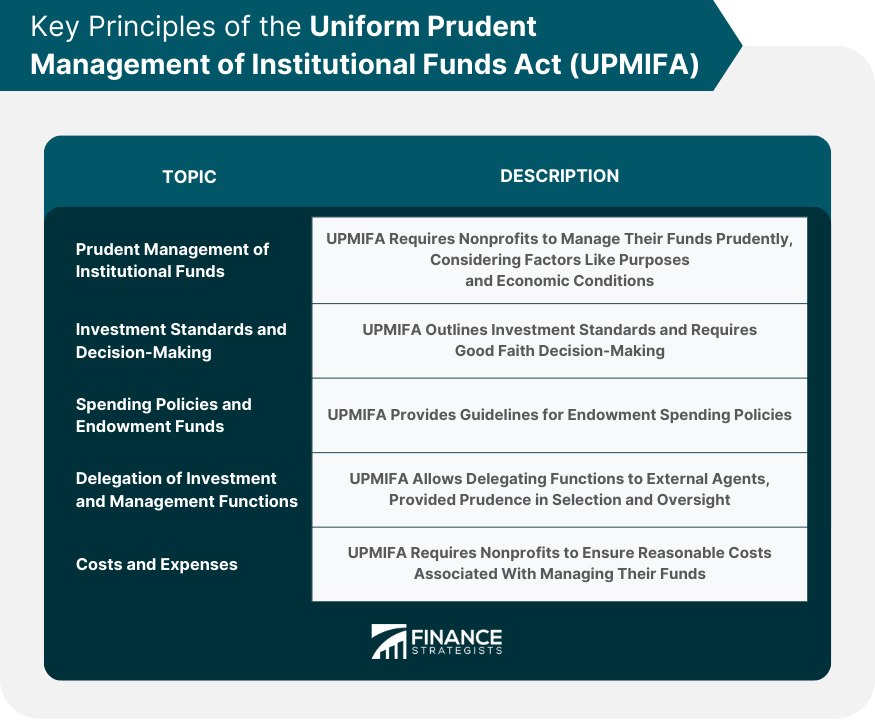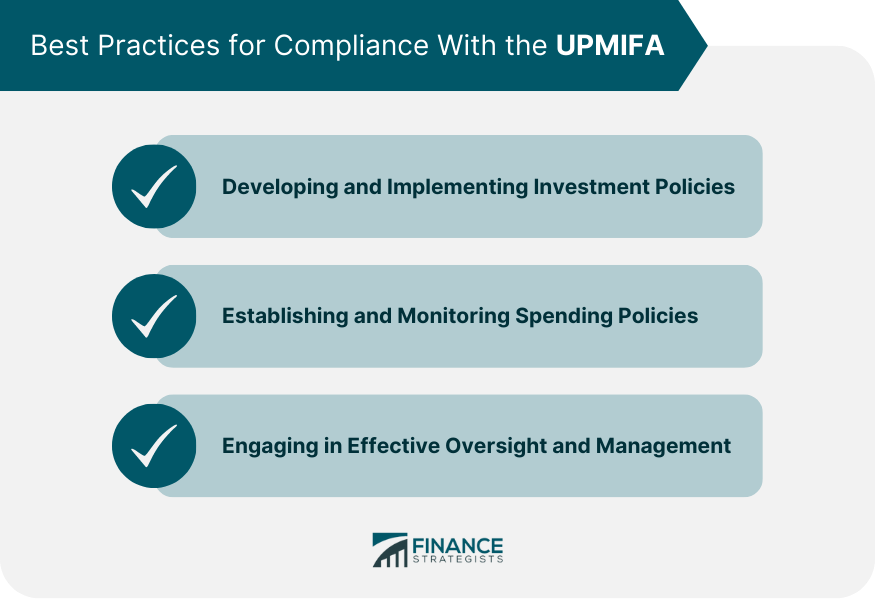The Uniform Prudent Management of Institutional Funds Act is a legal framework that sets guidelines for the prudent management of funds held by charitable institutions and nonprofit organizations. UPMIFA provides rules for investment decisions, spending policies, and endowment management. UPMIFA was designed to update and modernize the rules governing the management of institutional funds, replacing the previous Uniform Management of Institutional Funds Act (UMIFA). The purpose of UPMIFA is to ensure that charitable funds are managed prudently while allowing institutions the flexibility to adapt to changing economic conditions. UPMIFA requires nonprofit organizations and their boards to manage their funds prudently, taking into account factors such as the organization's purposes, the general economic conditions, and the possible effects of inflation and deflation. UPMIFA outlines a set of investment standards for organizations to follow, such as diversifying investments, evaluating risk and return, and considering the organization's overall investment strategy. The Act requires organizations to make investment decisions in good faith and with the care that a prudent person would take under similar circumstances. UPMIFA provides guidelines for nonprofit organizations to establish spending policies for endowment funds. The Act allows organizations to spend from an endowment fund based on a prudent assessment of the fund's long-term needs, factoring in the organization's purposes, current economic conditions, and the preservation of the fund's purchasing power. UPMIFA allows nonprofit organizations to delegate investment and management functions to external agents, such as investment managers or financial advisors, provided they exercise prudence in selecting, overseeing, and monitoring these agents. UPMIFA requires nonprofit organizations to consider the costs and expenses associated with managing their funds, ensuring that these costs are reasonable and appropriate in relation to the organization's overall investment strategy. UPMIFA applies to a wide range of nonprofit organizations, including educational institutions, religious organizations, and charitable foundations. The Act governs the management of institutional funds, including endowment funds and other restricted funds. UPMIFA has significant implications for nonprofit organizations' investment strategies and asset management practices. The Act requires organizations to adopt a prudent approach to investment decision-making, focusing on factors such as risk, return, and diversification. UPMIFA may impose reporting and disclosure requirements on nonprofit organizations, depending on state-specific laws. Organizations may be required to provide information about their investment strategies, spending policies, and the performance of their funds to regulators, donors, or other stakeholders. Donor-restricted funds are funds that a donor has designated for a specific purpose or with certain restrictions, such as endowment funds or funds for a specific project. UPMIFA provides rules for managing these funds to ensure they are used in accordance with the donor's intent. UPMIFA allows nonprofit organizations to modify or release donor restrictions on funds in certain circumstances, such as when the original purpose of the restriction becomes impracticable, unlawful, or wasteful. Organizations must seek court approval or obtain the donor's consent to make such changes. UPMIFA has significant implications for the management of donor-restricted funds, as it requires organizations to manage these funds prudently and in accordance with the donor's intent. The Act also provides guidelines for modifying or releasing donor restrictions when necessary, ensuring that organizations can adapt to changing circumstances while honoring their obligations to donors. UPMIFA is a uniform act, meaning that each state must adopt it individually to become effective in that jurisdiction. Most states in the United States have adopted UPMIFA, with some variations or amendments to address specific state concerns or legal environments. While UPMIFA aims to provide a uniform standard for the management of institutional funds, some states have made changes to the Act to address specific concerns or to align UPMIFA with their existing laws. Nonprofit organizations should be aware of any variations or amendments to UPMIFA in their state and adjust their investment and management practices accordingly. To comply with UPMIFA, nonprofit organizations should develop and implement written investment policies that outline the organization's objectives, risk tolerance, and investment strategies. These policies should be reviewed and updated regularly to ensure they remain aligned with the organization's needs and circumstances. Nonprofit organizations should establish prudent spending policies for their endowment funds and other restricted funds, taking into account factors such as the organization's purposes, current economic conditions, and the preservation of the funds' purchasing power. Organizations should regularly monitor their spending policies to ensure they continue to serve the organization's needs effectively. Nonprofit organizations should exercise diligent oversight and management of their institutional funds, including delegating investment and management functions to external agents when appropriate. Organizations should also monitor the performance of their funds and external agents regularly to ensure they are meeting the organization's objectives and complying with UPMIFA's requirements. The Uniform Prudent Management of Institutional Funds Act is a legal framework that establishes guidelines for the prudent management of funds held by nonprofit organizations and charitable institutions. The Act provides rules for investment decisions, spending policies, and endowment management while emphasizing the importance of prudent decision-making, diversification, and risk management. Nonprofit organizations must adhere to UPMIFA's principles to ensure they are acting in the best interests of their beneficiaries and donors. Understanding and complying with UPMIFA is essential for effective nonprofit investment management. To ensure compliance with UPMIFA, nonprofit organizations should develop sound investment policies, establish and monitor spending policies, and engage in effective oversight and management of their funds. By following these best practices, organizations can effectively manage their institutional funds in accordance with UPMIFA and fulfill their fiduciary duties.What Is the Uniform Prudent Management of Institutional Funds Act (UPMIFA)?
Key Principles of UPMIFA
Prudent Management of Institutional Funds
Investment Standards and Decision-Making
Spending Policies and Endowment Funds
Delegation of Investment and Management Functions
Costs and Expenses

Application of UPMIFA to Nonprofit Organizations
Nonprofit Organizations Subject to UPMIFA
Impact on Investment Strategies and Asset Management
Reporting and Disclosure Requirements
UPMIFA and Donor-Restricted Funds
Definition and Types of Donor-Restricted Funds
Modification or Release of Donor Restrictions
UPMIFA's Impact on Donor-Restricted Funds Management
UPMIFA and State Adoption
State-By-State Adoption of UPMIFA
Variations and Amendments to UPMIFA
Best Practices for Compliance With UPMIFA
Developing and Implementing Investment Policies
Establishing and Monitoring Spending Policies
Engaging in Effective Oversight and Management

Conclusion
By following the principles outlined in the Act, organizations can make prudent investment decisions that protect the interests of their beneficiaries and donors while helping to achieve their financial goals.
Uniform Prudent Management of Institutional Funds Act FAQs
UPMIFA is a law that provides guidelines for the management and investment of endowment funds and other institutional funds held by non-profit organizations such as universities, hospitals, and charities. UPMIFA sets standards for the prudence and care that must be exercised in the management and investment of these funds.
UPMIFA requires organizations to exercise prudent management and investment practices, and to consider factors such as the organization's charitable purposes, economic conditions, and the need for preservation of the purchasing power of the funds. The law also allows organizations to spend from endowment funds in certain circumstances, such as for a donor-specified purpose or to avoid a reduction in the purchasing power of the endowment.
UPMIFA is an updated version of UMIFA, which was first established in 1972. UPMIFA provides more specific guidelines for managing and investing institutional funds, and allows for more flexibility in spending from endowment funds. Additionally, UPMIFA includes provisions for managing "underwater" endowments, where the fair market value of the endowment falls below its original gift value.
UPMIFA requires non-profit organizations to follow prudent management and investment practices when managing and investing institutional funds. This includes taking into account the organization's charitable purposes, the economic conditions, and the need for preservation of the purchasing power of the funds. Organizations may need to update their investment policies and procedures to comply with UPMIFA, and should consult with legal and financial advisors to ensure they are in compliance.
To comply with UPMIFA, non-profit organizations should develop and maintain appropriate investment policies and procedures, including a process for monitoring and evaluating investment performance. Organizations should also establish a spending policy that takes into account factors such as the organization's charitable purposes, economic conditions, and the need for preservation of the purchasing power of the funds. It is recommended that non-profit organizations work with legal and financial advisors to ensure they are in compliance with UPMIFA.
True Tamplin is a published author, public speaker, CEO of UpDigital, and founder of Finance Strategists.
True is a Certified Educator in Personal Finance (CEPF®), author of The Handy Financial Ratios Guide, a member of the Society for Advancing Business Editing and Writing, contributes to his financial education site, Finance Strategists, and has spoken to various financial communities such as the CFA Institute, as well as university students like his Alma mater, Biola University, where he received a bachelor of science in business and data analytics.
To learn more about True, visit his personal website or view his author profiles on Amazon, Nasdaq and Forbes.















